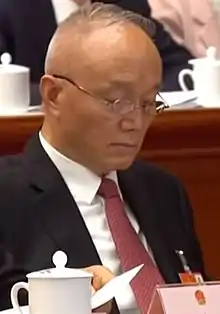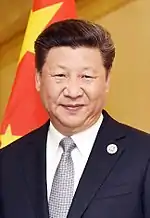Cai Qi
Cai Qi (Chinese: 蔡奇; pinyin: Cài Qí; born December 5, 1955) is a Chinese politician, the current Communist Party Secretary of Beijing, and a member of the Politburo of the Communist Party of China. Cai began his career in Fujian province. He has served successively as the mayor of Sanming, the mayor of Quzhou, the Communist Party Secretary of Taizhou, Zhejiang, and mayor of Hangzhou. Beginning in 2010 he served as the Executive Vice Governor of Zhejiang Province, and in 2014 was transferred to Beijing to serve as deputy director of the General Office serving the National Security Commission (rank equivalent of minister).[1][2]
Cai Qi | |
|---|---|
蔡奇 | |
 | |
| Communist Party Secretary of Beijing | |
| Assumed office 27 May 2017 | |
| Deputy | Chen Jining (mayor) |
| General secretary | Xi Jinping |
| Preceded by | Guo Jinlong |
| Mayor of Beijing | |
| In office 31 October 2016 – 27 May 2017 (acting until 20 January 2017) | |
| Party Secretary | Guo Jinlong |
| Preceded by | Wang Anshun |
| Succeeded by | Chen Jining |
| Mayor of Hangzhou | |
| In office April 2007 – February 2010 | |
| Preceded by | Sun Zhonghuan |
| Succeeded by | Shao Zhanwei |
| Head of the Organization Department of the Zhejiang Provincial Party Committee | |
| In office June 2010 – November 2013 | |
| Party Secretary | Zhao Hongzhu Xia Baolong |
| Preceded by | Si Xinliang |
| Succeeded by | Hu Heping |
| President of the Beijing Organising Committee for the 2022 Olympic and Paralympic Winter Games | |
| Assumed office June 9, 2017 | |
| Leader | Thomas Bach |
| Preceded by | Guo Jinlong |
| Personal details | |
| Born | December 5, 1955 Youxi County, Fujian, China |
| Political party | Communist Party of China |
| Alma mater | Fujian Normal University |
Largely due to Cai's extensive experience working in Zhejiang province, he is believed to be a political ally of Party General Secretary Xi Jinping. Cai was also known for his extensive use of social media and his unorthodox approach to governance.[2] Cai has referred to Xi as "Xi Dada" (father) and "Boss Xi!" in public media.[3] The Economist opined in 2017 as Cai "rocketed up the Communist Party’s ranks" that "Xi Jinping has chosen an unusual man to lead the capital city."[4] Cai is said to have been a fan of Kevin Spacey's House of Cards TV serial, and was cited as a fan of the iPhone product.[5]
Biography
Early years
Cai was born in Youxi County, Fujian province in December 5, 1955. During the latter years of the Cultural Revolution he worked at a rural commune. He joined the Communist Party of China in 1975. Cai attended Fujian Normal University and graduated in 1978 with a degree in political economics.[6]
Fujian years
In the 1980s, Cai served in the General Office of the provincial party organization in Fujian province, gaining a series of rapid promotions.[6] He worked as deputy chief of staff serving provincial leaders, including as secretary to the provincial party chief. Between 1994 and 1997, he pursued a master's degree in law at his alma mater.[6]
In September 1996 Cai took on his first major role in local government as the deputy Party secretary and later mayor of the city of Sanming in Fujian province.[6] He was transferred to Zhejiang in May 1999 serving as the deputy Party Secretary and Mayor of Quzhou.[6] Between March 2002 and April 2004 Cai served as Quzhou's party secretary, the top political office of the city.[6] In April 2004 Cai became party chief of Taizhou, Zhejiang; at the time, Xi Jinping was the party chief of Zhejiang province.[6] In April 2007, Cai was promoted to the position Mayor of Hangzhou, the provincial capital, also serving as deputy Party Secretary.[6] In January 2010, he became a member of the provincial Party Standing Committee as head of the party's provincial Organization Department.[6]
In November 2013, Cai became the Executive Vice Governor of Zhejiang province. He made the announcement of his change in jobs on his microblog account.[7]
Cai has a doctoral degree in political economics which he obtained from 1999.09 to 2001.07 at Fujian Normal University.[6]
Beijing years
In March 2014, Cai was said to have been transferred to Beijing to work as the deputy General Office chief of the National Security Commission, a body led by party General Secretary Xi Jinping, though no official announcement was made about this appointment. Given his Zhejiang work experience and his current position and seniority, Cai has been named as a member of the so-called "New Zhijiang Army", i.e., officials who at one point worked under Xi Jinping during his term as Zhejiang party chief.[8]
After his transfer to Beijing, Cai stopped updating his various social media accounts. The only indication of his whereabouts appeared in news footage at numerous "study sessions" of the Politburo of the Communist Party of China, where he was shown seated next to other minister-level officials, suggesting that he was an official of full provincial-ministerial rank and working for the central party organization. It was later confirmed that he was serving as Deputy Director of the Office of the National Security Commission.[9]
On 31 October 2016, Cai was appointed acting mayor of Beijing, replacing Wang Anshun;[9] he was confirmed in January 2017.
In May 2017, Cai Qi was appointed party secretary of Beijing. Cai's appointment broke nearly all conventions in post-Cultural Revolution political tradition: he was neither a member nor alternate member of the Central Committee, and took on an office that would, under normal circumstances, be accorded Politburo membership. The move assured him a Politburo seat at the 19th Party Congress.[10]
In June 2017 Cai was appointed President of the Beijing Organising Committee for the 2022 Olympic and Paralympic Winter Games.
In June 2020, Cai was appointed to lead the team charged with the elimination of coronavirus in the Xinfadi market.[11]
Social media
Cai maintains a Weibo microblog account under the subtitle "Cai Qi, a Bolshevik",[12][3] which has been active since May 2010. The account was initially opened under the name Qianshui (潜水; literally, "scuba diving"), but he was eventually 'outed' by internet users. The account is 'followed' by over ten million people.[3] He used it regularly to communicate with ordinary internet users.[13] As a sub-provincial-level official Cai was one of the highest-ranking officials to maintain a regular social media presence,[14] though he has not updated his Weibo feed since being called to work in Beijing. It is the opinion of certain political scholars that Cai used this Weibo tool to circumvent existing CCP apparatus and thereby gain public profile, "considerable influence" within the CCP and thereby promotion.[14] Cai has stated of the CCP that:[15]
We need to learn and get used to work in a 'glass room'. Weibo is a direct way to the grassroots which can help us to know what people want and think. My Weibo can partly solve the misunderstanding between people and government by solving their problems and sincerely talking to them.
During the 2012 National People's Congress, an incident occurred in which vicious dogs allegedly belonging to a state agency were said to be injuring people. After seeing news of the incident reported online, Cai immediately called the agency in question to ask for an explanation, then posted the results of his discussion on his microblog feed. Cai's role in resolving the issue earned him accolades online. On the evening of September 14, 2013, a mother of an ordinary government staffer working for the national revenue agency posted on her microblog feed that her son was expected to partake in heavy drinking with superiors on a regular basis as part of his work and that it was affecting his health. The mother pleaded for attention to the case by then Zhejiang party organization chief Cai Qi. A day later Cai responded to her asking which department her son worked at and vowed publicly "your son doesn't have to drink from now on."[16][3]
References
- http://www.chinavitae.com/biography/Cai_Qi%7C5056 name=Cai
- "原浙江副省长蔡奇传调任国安委". South China Morning Post (Chinese). March 29, 2014.
- Ranade, Jayadeva (2017). Xi Jinping's China. KW Publishers Pvt Ltd. p. 189. ISBN 9789386288912.
- "Xi Jinping has chosen an unusual man to lead the capital city". The Economist. 13 July 2017.
- "The rise and rise of Xi Jinping's new man in Beijing". South China Morning Post. 28 May 2017.
- 蔡奇个人简历 (in Chinese). Hangzhou People's Government. July 2010. Archived from the original on 2010-10-16. Retrieved 2010-11-14.
- "蔡奇任浙副省长仅4月即去职 拥有千万微博"粉丝"". 163. March 28, 2014.
- "政坛新派系崛起 港媒盘点之江新军". Duowei News.
- "Cai Qi Appointed Acting Mayor of Beijing". Caixin. 31 October 2016.
- "蔡奇任北京市委书记 郭金龙不再兼任(图/简历)". 新华社.
- Yan, Yan; Li, Yuan (13 June 2020). "蔡奇調度疫情防控工作並赴豐台區西城區現場檢查時要求 果斷處置精准防控 迅速堅決阻斷傳染源". People's Network. cpcnews.cn.
Cai Qi dispatched epidemic prevention and control work and went to the on-site inspection in Xicheng District of Fengtai District to require decisive treatment and precise prevention and control, and quickly and resolutely block the source of infection
- "QQ Microblog, Cai Qi".
- "港媒:大V官員蔡奇料入國安辦 出任專職副主任". Takungpao. March 28, 2014.
- Wang, Boyong; Wang, Shaoyu (2014). "Social Media Development and Implication on eGovernance in China". In Sonntagbauer, Peter (ed.). Handbook of Research on Advanced ICT Integration for Governance and Policy Modeling. IGI Global. ISBN 9781466662377.
- Liu, Wei (1 November 2016). "Meet Cai Qi, long-time online celeb and Beijing's acting mayor". China Daily Information Co.
- "母亲微博哀怨儿子陪酒伤身 蔡奇怒斥". Sohu. September 17, 2013.
| Sporting positions | ||
|---|---|---|
| Preceded by |
President of Organizing Committee for Winter Olympic Games 2022 |
Succeeded by |
| Government offices | ||
| Preceded by Wang Anshun |
Mayor of Beijing 2016–2017 |
Succeeded by Chen Jining |
| Preceded by Sun Zhonghuan |
Mayor of Hangzhou 2007–2010 |
Succeeded by Shao Zhanwei |
| Party political offices | ||
| Preceded by Guo Jinlong |
Communist Party Secretary of Beijing 2017– |
Incumbent |
| Preceded by Si Xinliang |
Head of the Organization Department of Zhejiang province 2010–2013 |
Succeeded by Hu Heping |


.svg.png.webp)
